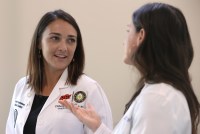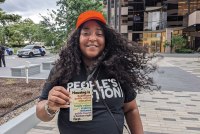Latest KFF Health News Stories
Epidemic: The Scars of Smallpox
The series finale of “Epidemic: Eradicating Smallpox” is a visit to the home of Rahima Banu, the last person with a documented case of naturally occurring variola major smallpox. When the virus was declared eradicated, she became a symbol of one of the greatest victories in global public health. What happened to Rahima Banu afterward?
Children Who Survive Shootings Endure Huge Health Obstacles and Costs
A new study finds that young people who have been injured by firearms are more prone to psychiatric diagnoses and developing a substance use disorder than kids who have not been shot — and their families also suffer long-term ill effects.
La resistencia a empezar más tarde tiene menos que ver con dificultades logísticas y financieras, sobre todo en aspectos básicos como el transporte escolar.
As Transgender ‘Refugees’ Flock to New Mexico, Waitlists Grow
As many states have moved to restrict or ban gender-affirming care for trans people, a few states, including New Mexico, have codified protections. But those laws don’t always mean accessing care is simple or quick, as a surge in new patients in the state collides with limited doctors and clinics.
Science Says Teens Need More Sleep. So Why Is It So Hard to Start School Later?
Sleep deprivation in adolescents is linked to mental health struggles, worse grades, traffic accidents, and more. That’s why states such as California and Florida have mandated later high school start times. But opposition to later times is less about the science than it is about logistics and costs.
Medicare amplía su lista de profesionales de salud mental
Los prejuicios sobre las afecciones mentales y la discriminación por edad hacen que algunos profesionales no tomen en serio el sufrimiento de las personas mayores, profundizando las barreras de acceso a la atención.
Nursing Homes Say They Can’t Afford Higher Staffing. But Their Finances Are Often Opaque.
Perhaps the biggest mystery, as the Biden administration moves to force nursing homes to boost staffing, is this: how much extra money do the nation’s 15,000 homes actually have to hire and retain more nurses and aides? Public comments are due Monday on the most sweeping regulatory changes to hit the industry in decades. The […]
Medicare Expands the Roster of Available Mental Health Professionals
Medicare is expanding access to mental health counselors and marriage and family therapists come Jan. 1. But the belief that seniors who suffer from mental health problems should just grin and bear it remains a troubling barrier to care.
Biden Pick to Lead Social Security Pledges Action on ‘Heartbreaking’ Clawbacks
At a Senate confirmation hearing, former Maryland Gov. Martin O’Malley said he would address hardships the Social Security agency has caused by demanding money back from beneficiaries.
States Reconsider Religious Exemptions for Vaccinations in Child Care
Providers and health care advocates warn a proposed rule change in Montana would jeopardize immunity levels in child care centers and communities. Efforts to change vaccination exemption rules are underway in other states, too.
What the Health? From KFF Health News: For ACA Plans, It’s Time to Shop Around
It’s Obamacare open enrollment season, which means that, for people who rely on these plans for coverage, it’s time to shop around. With enhanced premium subsidies and cost-sharing assistance, consumers may find savings by switching plans. It is especially important for people who lost their coverage because of the Medicaid unwinding to investigate their options. Many qualify for assistance. Meanwhile, the countdown to Election Day is on, and Ohio’s State Issue 1 is grabbing headlines. The closely watched ballot initiative has become a testing ground for abortion-related messaging, which has been rife with misinformation. This week’s panelists are Mary Agnes Carey of KFF Health News, Jessie Hellmann of CQ Roll Call, Joanne Kenen of the Johns Hopkins Bloomberg School of Public Health and Politico, and Rachana Pradhan of KFF Health News.
Medical Debt Is Disappearing From Americans’ Credit Reports, Lifting Scores
As credit rating agencies have removed small unpaid medical bills from consumer credit, scores have gone up, a new study finds.
“Peor de lo que la gente cree”, cambios en Medicaid crean caos en los estados
Tanto beneficiarios como defensores de pacientes dicen que los funcionarios de Medicaid enviaron formularios de renovación obligatoria a direcciones viejas, calcularon mal los niveles de ingresos e hicieron malas traducciones de los documentos.
‘Worse Than People Can Imagine’: Medicaid ‘Unwinding’ Breeds Chaos in States
As Medicaid programs across the nation review enrollees’ status in the wake of the pandemic, patients struggle to navigate the upheaval.
The AMA May Reconsider Single-Payer Health Care
Is the American Medical Association going soft on single-payer health care? We’re about to find out. For more than a century, the most influential U.S. physician group has stridently opposed what could generally be described as “national health insurance.” It famously helped defeat health reform efforts in the 1930s and 1940s, delayed the establishment of […]
Medical School on Cherokee Reservation Will Soon Send Doctors to Tribal, Rural Areas
Native Americans and rural residents are underrepresented in medical schools. But in this new program, 25% of students are Indigenous and half are from rural areas.
Gubernatorial Candidates Quarrel Over Glory for Winning Opioid Settlements
Some gubernatorial candidates are sparring over bragging rights for their state’s share of $50 billion in opioid settlement funds. Many of the candidates are attorneys general who pursued the lawsuits that produced the payouts.
Street Medicine Practitioners Are Getting Paid. Now They Want Higher Rates.
Street medicine, the practice of caring for homeless people outdoors, is a burgeoning field — an unfortunate reality as America confronts a growing homelessness epidemic. But it’s at least become a little more rewarding after the Biden administration made an under-the-radar yet revolutionary change to Medicaid. Starting this month, doctors, nurses and other providers can bill […]
Comienza la inscripción para los seguros de salud del Obamacare
Los consumidores pueden ir en línea, llamar o buscar ayuda de un corredor, o un navegador, para conocer sus opciones de cobertura para 2024, calcular sus posibles subsidios o cambiar de plan.
Medical Debt and Nurse Shortages Haunt Winning Halloween Haikus
Entries for our fifth annual Halloween haiku contest left us terrified. Based on a review by our panel of judges, here’s the winner and runners-up — plus the original artwork they inspired.

















